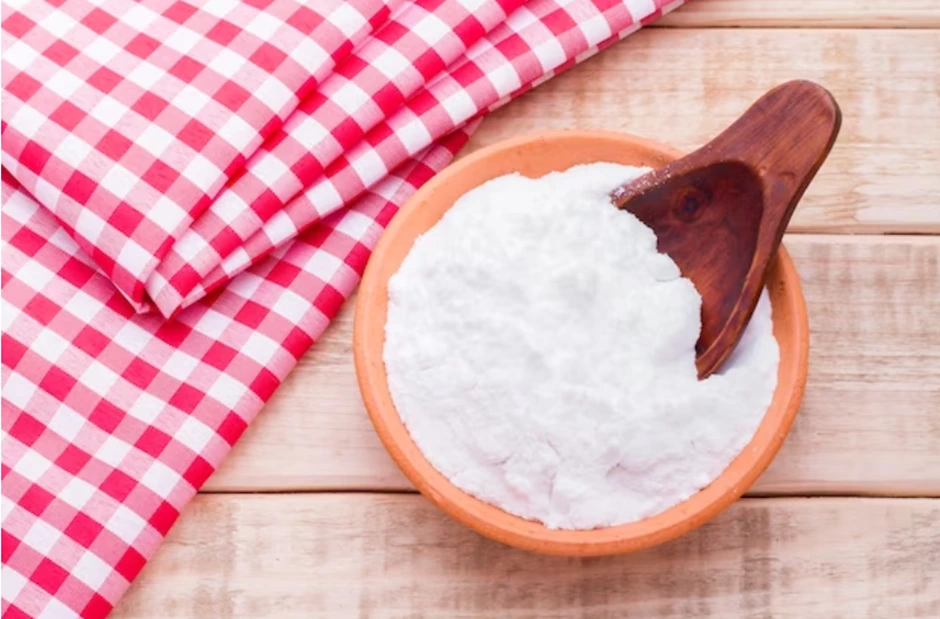The Popularity of Baking Soda as a Stain Remover
Baking soda, also known as sodium bicarbonate, has long been recognized as one of the most versatile household chemicals. From cooking to cleaning, its uses are numerous. In the context of stain removal, baking soda has gained popularity for being effective, safe, and environmentally friendly.
For households, the appeal lies in its low cost and non-toxic profile. Consumers use it for everything from whitening laundry to scrubbing surfaces. For industries, however, baking soda’s role as a functional ingredient in cleaning formulations adds value on a much larger scale.
According to Healthline, baking soda is mildly alkaline, which makes it an effective neutralizer for acidic stains and odors. This dual functionality, working as both a stain remover and deodorizer explains its global adoption.
More about Sodium Bicarbonate from our Product page: Food Additives Asia – Baking Soda
The Science Behind Baking Soda’s Cleaning Power
The effectiveness of baking soda as a stain remover comes from its alkaline nature. When dissolved in water, it forms a mild solution that can break down acids, grease, and other organic compounds.
-
Abrasive quality: The fine crystalline texture provides a gentle scrubbing action without damaging surfaces.
-
Odor neutralization: Baking soda reacts with acidic compounds, reducing unpleasant smells.
-
Moisture absorption: Useful in cleaning applications where dampness causes stains or odors.
From a scientific perspective, these properties make baking soda suitable not only for small household tasks but also for formulated cleaning agents in industrial production.
Everyday Uses of Baking Soda for Stain Removal
Coffee and Tea Stains
Baking soda is often used to remove stubborn stains on cups, countertops, and fabrics. By making a simple paste of baking soda and water, consumers can gently scrub away discoloration without the use of harsh chemicals.
Grease and Oil Marks
Oil stains on kitchen surfaces or fabrics are notoriously difficult to clean. Baking soda helps by absorbing grease and breaking down fatty acids, making it easier to lift stains during washing.
Carpet and Upholstery Cleaning
Sprinkling baking soda on carpets before vacuuming can lift dirt and neutralize odors. When used with a bit of water, it can also help clean fabric upholstery without leaving chemical residues.
For B2B readers, these everyday uses demonstrate why consumers continue to demand cleaning products that include baking soda in their formulations.
Industrial Applications of Baking Soda in Cleaning
Laundry and Textile Industry
In the textile industry, baking soda is used as an additive in detergents to enhance stain removal and odor control. Its alkalinity boosts detergent performance, especially for neutralizing acidic stains such as sweat, wine, or fruit juice.
Industrial laundries also use baking soda to maintain pH balance, protecting fabrics from damage during large-scale washing cycles.
Detergent and Cleaning Product Formulation
Baking soda is a common ingredient in powdered detergents, surface cleaners, and multipurpose scrubs. It offers manufacturers a cost-effective way to create eco-friendly products without compromising cleaning efficacy.
Compared to harsher chemicals like chlorine bleach, sodium bicarbonate is considered safer for consumers and the environment, which makes it attractive in the era of clean-label and sustainable products.
Food Processing and Sanitation
Baking soda plays a role in cleaning food processing equipment. It removes residues without leaving toxic traces, which is crucial for maintaining hygiene standards. Some beverage companies even use it in cleaning-in-place (CIP) systems to neutralize acidic residues.
Learn more about baking soda’s applications at Sodium Bicarbonate: Preserving Food Shelf-Life.
Why Baking Soda is Preferred by Manufacturers?
There are several reasons why baking soda is favored across industries:
-
Cost efficiency: Readily available and affordable compared to other specialty cleaning agents.
-
Versatility: Functions as a stain remover, deodorizer, and pH buffer.
-
Eco-friendly profile: Unlike phosphates or bleach, it is biodegradable and safe for wastewater systems.
-
Consumer trust: Baking soda is familiar and widely accepted by consumers, making it a strong selling point for manufacturers of detergents and cleaning products.
According to NCBI, baking soda is considered one of the safest compounds for use in both household and industrial formulations due to its non-toxic and biodegradable nature.
Safety, Sustainability, and Regulatory Standards
From a regulatory perspective, baking soda is classified as Generally Recognized as Safe (GRAS) by the FDA. It is approved for use not only in food but also in cleaning and personal care applications.
In Europe, the European Food Safety Authority (EFSA) and the European Chemicals Agency (ECHA) classify sodium bicarbonate as safe for industrial applications, provided proper handling is observed.
For B2B buyers, this means baking soda represents a low-risk, high-utility investment that meets both consumer and regulatory expectations for safe and sustainable cleaning solutions.
Conclusion
Baking soda’s reputation as a stain remover goes beyond DIY household hacks. For industries, it represents a powerful and versatile ingredient that enhances detergent performance, improves textile cleaning, and supports safe sanitation in food processing.
By bridging its role in everyday stain removal with its industrial applications, manufacturers can see why this simple compound remains in high demand across sectors.
Discover more about sodium bicarbonate’s role in the global market and sourcing high-quality Baking Soda for industrial use at Sodium Bicarbonate Market Overview: 2021–2033.


Leave a Comment